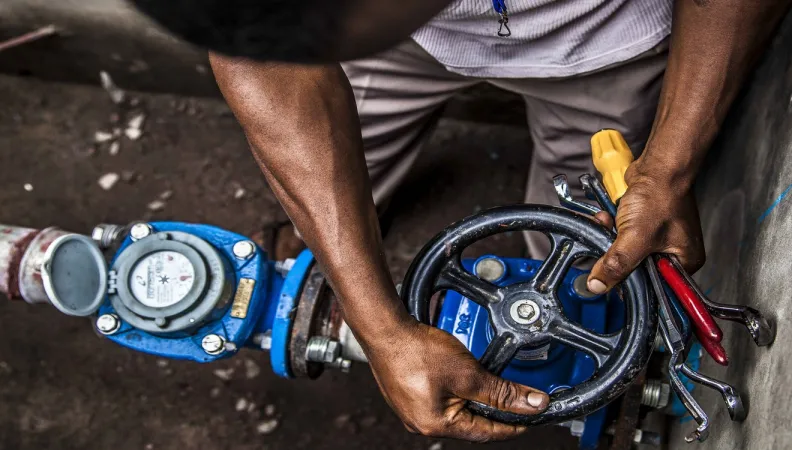Share the page
Combating Cholera in the Congo by Renovating Water Infrastructure
Published on

The Democratic Republic of the Congo is home to half of Africa’s water reserves, but only a quarter of the DRC’s population has access to affordable drinking water. Deteriorating infrastructure has contaminated the water, causing diseases such as typhoid fever, amoebic dysentery and cholera. An AFD-backed project has renovated the water supply infrastructure to make water cleaner and safer to use.
Uvira EN
|
Evaluations Report 2023
Our work in photos and figures
Find out more
|
The town of Uvira, in the east of the Democratic Republic of Congo (DRC), is in a region where cholera is endemic. A project to tackle major waterborne diseases has renovated water supply network infrastructure, supported the creation of user associations to manage them, and raised awareness of good hygiene practices.
To respond effectively to the risks posed by contaminated water in Uvira, AFD and its partners - the European Union, the Veolia Foundation and Oxfam - have opted for a long-term approach that complements the work of their humanitarian partners, and supports local authorities in their efforts to improve the drinking water network.
See also: “Water is central to achieving the sustainable development goals”
Four districts now 100% covered
Despite unprecedented flooding in 2020 due to climate change and armed interniccine conflict, the project was successfully completed. In the neighborhoods targeted by the project, access to drinking water has increased significantly, and four of them are now fully covered by the water network: all residents have either a private hook-up or a standpipe within 200 meters of their home.
The London School of Hygiene & Tropical Medicine research center evaluated the "Water to combat cholera in Uvira" project from 2014 to 2022, whose aim is to tackle the very source of all water-borne diseases – not just cholera.
“Important lessons have been learned from this assessment,” said Jaime Saidi, Water, Hygiene and Sanitation Coordinator at the Uvira Health Zone. “They will help to improve the design and implementation of other such initiatives."
See also: Evaluations Report 2023
Preparing communities for the future
The evaluation shows the need to improve the use and management of water network infrastructure available to communities. "People need to be trained to use them properly, but also to maintain them,” added Jaime Saidi.
"Providing the right equipment is essential, but it's also vital that everyone knows how to properly use it. It is also essential to prepare communities in advance. The challenge is to work through local leaders, so that as many people as possible are aware and informed of what is being done, who is behind it, who is financing it, who is implementing it and why."
Beyond accessibility, guaranteeing continuity of service
A clear link has also been established between service continuity and the incidence of diarrheal diseases, including cholera, through various epidemiological analyses. Increasing water production hours by just 5% would reduce the incidence of cholera in Uvira by a quarter.
Still, there is much work to do to provide the number of faucets necessary to serve the local population. And analysts concluded there should be an effort to make the network more cost-effective. “The economic analysis conducted as part of the evaluation revealed that the cost of this project was very high compared to other similar operations,” explained Pierre-Yves Durand, AFD evaluation officer.
"This is due to the extremely complex situation in Uvira. Nevertheless, large-scale work in these areas is crucial if we are to make a significant impact and contain these diseases.”
